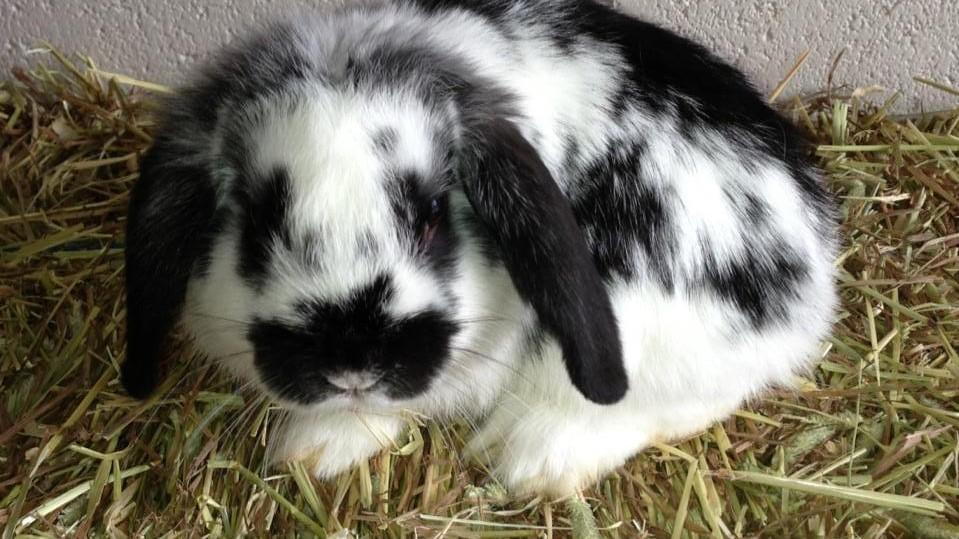Common Illnesses in Rabbits

- posted: Sep. 12, 2021
Common Illnesses in Rabbits
Rabbits make good pets and, if well cared for, can live 5-10 years. But they can be prone to some common illnesses. Here, we will discuss three common problems that you may encounter if you own a rabbit.
- Dental issues-rabbits and hares are not rodents but a separate order called lagomorphs (this group also includes pikas). Their teeth differ slightly from those of rodents. A rabbit’s teeth continuously grow. If the teeth do not align properly (malocclusion) or if the rabbit has a poor diet, they may not wear down and can grow too long causing problems with eating and chewing. A rabbit may also develop an infection or abscess inside the mouth. Rabbits with dental issues may display signs like drooling, loss of appetite, weight loss, and pawing at the mouth.
- The front teeth or incisors can be trimmed or ground down every few weeks by a veterinarian if they grow too long. If the rabbit has a problem with his back teeth or molars, the rabbit will most likely need to be sedated to address the problem. The teeth may need to be trimmed or filed or even removed. Dental problems can cause a great deal of pain to a rabbit and should be addressed quickly if suspected. Feeding a proper diet may reduce some dental issues.
- Ear infections—Rabbits can be prone to ear infections due to their long ears and many skin folds within the ear canal. Lop eared breeds whose ears fold over may have a higher incidence of ear infection. A large amount of wax or debris in the ear canal can lead to bacterial infection. Rabbits can also get ear mites, though they are a different species of mite than those that infect dogs and cats.
- A rabbit with an ear infection may develop a head tilt and trouble staying upright and holding their balance. They may continuously fall or roll over (torticollis), stop eating and/or paw at their ears. There may be white or brown fluid in the ear canal. Stroke, trauma, cancer and other illnesses may also cause head tilt in rabbits so it is important to have your rabbit evaluated by a veterinarian to confirm the cause.
- Ear infections are diagnosed by examining the ear canal and taking a sample of debris or fluid from the ear to examine under the microscope for mites, bacteria or yeast. Appropriate treatment can then be started—most likely a combination or oral and topical antibiotics if the infection is due to bacteria. Treatment for mites or antifungal drugs may be needed if found to be the cause. Examine and clan your rabbit’s ears regularly, especially if she has floppy ears.
- Respiratory infection—Often known as “snuffles” due to the congested sounds affected rabbits make while breathing, the most common cause of sinus or respiratory infection is Pasturella bacteria though other bacterial and viral organisms are sometimes found. Stress or poor husbandry can often lead to infection. Rabbits with snuffles may have nasal and/or eye discharge, sneezing, lethargy, loss of appetite, difficulty breathing and decreased activity. Pasturella is highly contagious so if you have multiple rabbits, sick rabbits may need to be quarantined. A nasal swab and culture may be necessary to diagnose your rabbit. Rabbits who are very ill may need to be hospitalized for supportive care and treatment with antibiotics. Milder cases may be treated outpatient with antibiotics.
In all of these cases, supportive care such as IV fluids, pain medications or syringe feeding a special herbivore diet may be necessary to treat a sick rabbit. If your rabbit displays any sign of illness such as not eating/eating less than normal, decreased stool production or diarrhea, weight loss or lethargy/inactivity, have her seen by a veterinarian immediately. The sooner an illness is treated, the better the chance that your rabbit will recover.
This blog brought to you by the Patton Veterinary Hospital serving Red Lion, York and the surrounding communities.
https://vcahospitals.com/know-your-pet/dental-disease-in-rabbits
https://www.petmd.com/rabbit/conditions/ears/c_rb_otitis_media_interna
https://www.petmd.com/rabbit/conditions/respiratory/c_rb_pasteurellosis
Location
Patton Veterinary Hospital
425 E Broadway
Red Lion, PA 17356
